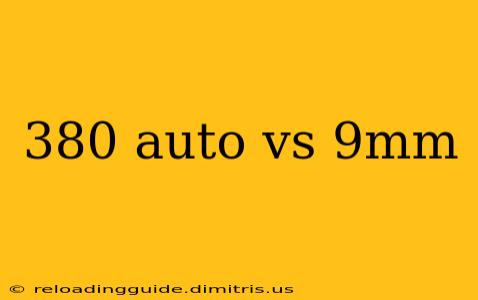.380 ACP vs. 9mm: A Comprehensive Comparison for Self-Defense and Concealed Carry
Choosing the right caliber for self-defense or concealed carry is a crucial decision, demanding careful consideration of various factors. This in-depth comparison of the .380 ACP (Automatic Colt Pistol) and the 9mm Parabellum (9x19mm) cartridges will help you understand the key differences and make an informed choice. We'll examine ballistics, recoil, capacity, availability, and more to guide your decision.
Understanding the Ballistics: Power and Penetration
The most significant difference between the .380 ACP and the 9mm lies in their ballistic performance. The 9mm round packs a considerably more potent punch, delivering significantly higher energy and penetration.
-
9mm: Generally boasts higher muzzle energy and velocity, resulting in greater stopping power and deeper penetration. This increased power translates to a higher likelihood of incapacitating a threat.
-
.380 ACP: Offers less stopping power and penetration compared to the 9mm. While still capable of causing serious injury, its smaller size and lower energy mean it's less likely to reliably stop a determined attacker. The effectiveness is highly dependent on shot placement.
Recoil and Shootability:
Recoil is a critical factor, especially for smaller-framed individuals or those new to firearms.
-
.380 ACP: Known for its manageable recoil, making it a popular choice for those seeking a less punishing shooting experience. This allows for faster follow-up shots and improved accuracy, particularly under stress.
-
9mm: Produces noticeably more recoil than the .380 ACP. While still manageable for most shooters, the increased recoil can impact accuracy and speed of follow-up shots, especially for less experienced users. However, modern 9mm firearms often mitigate recoil effectively through design features.
Magazine Capacity and Concealability:
Magazine capacity plays a role in self-defense scenarios.
-
.380 ACP: Typically offers slightly higher magazine capacity in smaller-sized pistols, making it suitable for deep concealment. However, the overall capacity is generally lower than that of 9mm handguns.
-
9mm: While some slimline 9mm pistols exist, they often have lower magazine capacities compared to their larger counterparts. Larger 9mm handguns generally hold more rounds, providing increased firepower in a self-defense situation.
Ammunition Availability and Cost:
Ammunition availability and cost are important practical considerations.
-
9mm: Boasts significantly wider availability and often lower cost per round compared to .380 ACP ammunition. This is a significant advantage for regular practice and training.
-
.380 ACP: While readily available, it's generally less common and more expensive than 9mm ammunition. This can impact the affordability of regular practice and stockpiling.
Choosing the Right Caliber for You:
The ideal caliber depends on individual needs and circumstances.
-
.380 ACP: A suitable option for those prioritizing concealability, manageable recoil, and ease of handling. It is a good choice for individuals with smaller hands or those new to firearms. However, the reduced stopping power should be carefully considered.
-
9mm: The preferred choice for those prioritizing stopping power and higher capacity, although recoil may be a factor. The greater availability and lower cost of ammunition are significant advantages for training and practice.
Conclusion:
Both .380 ACP and 9mm cartridges have their strengths and weaknesses. The 9mm generally offers superior stopping power and penetration, but with increased recoil. The .380 ACP provides manageable recoil and increased concealability, but at the cost of reduced stopping power. Careful consideration of your individual needs, physical capabilities, and experience level is crucial in determining which caliber is best suited for your self-defense and concealed carry needs. Consulting with experienced firearms instructors and professionals is highly recommended.

